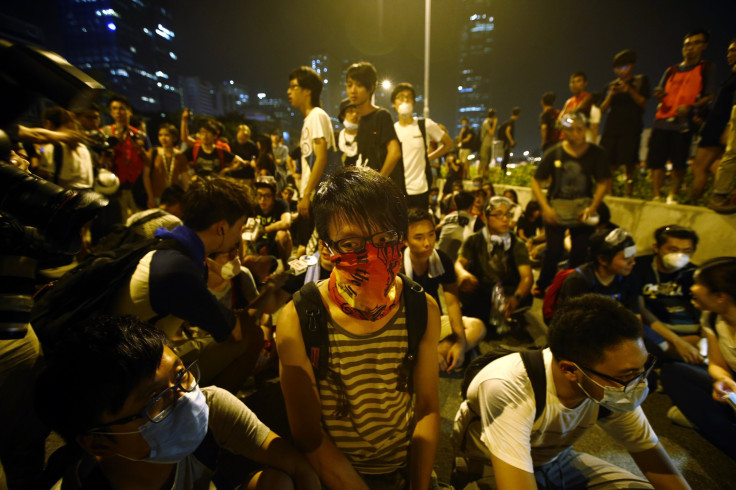Hong Kong Protesters Express Concern About Direction Of Movement As Leung Agrees To Talks

Following days of deliberation and strongly worded warnings from Beijing, Hong Kong Chief Executive Leung Chun-ying agreed late Thursday to organize talks between his government and the Hong Kong Federation of Students, one of the principal groups behind the protests that have engulfed the territory since last Sunday. But rather than spur the "Umbrella Revolution" forces into collective action, Leung's announcement brought marked tactical disagreements among the protesters to the surface, leading some participants to question the direction of the movement.
"We are worried that the movement will lose steam without a clear leader leading," Kenneth Mok, a 22-year-old student demonstrating in the Admiralty district, told CBC. "We are worried that people will go back to normal life like nothing has happened."
In a sign of this frustration, some protesters formed a human chain late Thursday at Lung Wu Road, one of the few major thoroughfares in Hong Kong that has remained open during the demonstrations. While arranging a meeting with the territory's government, protest leaders are also wary of alienating segments of Hong Kong's population heading back to work and school after China's Oct. 1 National Day holiday.
In addition to the Federation of Students, two other major groups have taken a leadership role in the demonstrations: Occupy Central for Peace and Love, and Scholarism, a student organization led by 17-year-old Joshua Wong. All three groups had united around calls for Leung's resignation, a demand that the chief executive has refused to entertain.
"I want to continue my task of ensuring the one-person one-vote election can take place in Hong Kong," Leung said Thursday.
Leung has dispatched Carrie Lam, Hong Kong's top civil servant, to lead the talks with the student group "as soon as possible." The current round of protests was sparked by a new election law that limits candidates for Hong Kong's 2017 chief executive elections to those vetted by Beijing. Protest leaders and supporters have called on the Chinese government to honor a pledge to provide genuine "universal suffrage" in the territory, whose foundational Basic Law allows it to retain separate legal, political, and economic systems from mainland China until 2047, the 50th anniversary of reunification.
© Copyright IBTimes 2024. All rights reserved.




















